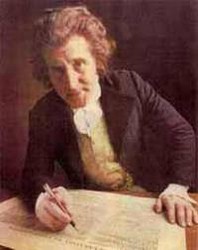Letters Of Thomas Jefferson
|
| updated |
Copy Link Code
|
 Besides the famous writings of Thomas Jefferson, much of what we know about the man himself comes from his personal letters. Over the course of his lifetime, Thomas Jefferson wrote hundreds if not thousands of such letters. In the private papers of Thomas Jefferson, we see a much more candid individual than in his public life. In lengthy arguments and philosophical debates with people like John Adams and Dr. Benjamin Rush, Jefferson espoused many radical notions that would have been quite controversial at the time. Ever since his time at the College of William & Mary as a youth, Jefferson had displayed the rare ability to imagine a future without the same circumstances as the present. Inspired by the philosophers of the European Enlightenment who foresaw the end of monarchy and the rise of liberty, Thomas Jefferson became one of the most forward-thinking politicians in the American colonies. When he was chosen to draft the Declaration of Independence, the great orator Benjamin Franklin acknowledged his confidence in the ability of a wordsmith such as Jefferson to inspire the people. Despite the many great contributions of Jefferson and his advanced ideals to the public sphere, it was only in his letters that the polymath could speak freely, especially about his social and religious beliefs.
Besides the famous writings of Thomas Jefferson, much of what we know about the man himself comes from his personal letters. Over the course of his lifetime, Thomas Jefferson wrote hundreds if not thousands of such letters. In the private papers of Thomas Jefferson, we see a much more candid individual than in his public life. In lengthy arguments and philosophical debates with people like John Adams and Dr. Benjamin Rush, Jefferson espoused many radical notions that would have been quite controversial at the time. Ever since his time at the College of William & Mary as a youth, Jefferson had displayed the rare ability to imagine a future without the same circumstances as the present. Inspired by the philosophers of the European Enlightenment who foresaw the end of monarchy and the rise of liberty, Thomas Jefferson became one of the most forward-thinking politicians in the American colonies. When he was chosen to draft the Declaration of Independence, the great orator Benjamin Franklin acknowledged his confidence in the ability of a wordsmith such as Jefferson to inspire the people. Despite the many great contributions of Jefferson and his advanced ideals to the public sphere, it was only in his letters that the polymath could speak freely, especially about his social and religious beliefs.
In the famous Thomas Jefferson letter to Danbury Baptists, written in 1802 during his first term as President of the United States, the separation of Church & State was established. Although this was not support for secularization, some private letters of Thomas Jefferson illuminate a man whose faith was based only on what he could observe in nature. Never published and only read by select friends and family before his death, the Jefferson Bible is the supreme example of Jefferson's unique ideology. By removing all accounts of miracles and supernatural details, Jefferson attempted to extract the philosophy of Jesus Christ without necessitating his divinity. The only contemporary discussion of these secular Gospels would occur between Jefferson and his small circle of trusted friends. Also relevant in understanding the vision of Thomas Jefferson in his later years is the founding of University of Virginia. Unlike almost every other college of the time, this public university did not adhere to any religious sect and even banned theology as a subject and centered the campus around a library instead of a church. It is in a letter to Thomas Cooper that Thomas Jefferson, author of the Virginia Statute for Religious Freedom, explained how theology could hinder students of other subjects from enjoying independence in their research and instruction. For all of the idealism espoused in the letters written by Jefferson, it is in a letter written to Jefferson that reality becomes clearer. In the famous Benjamin Banneker letter to Thomas Jefferson, written in 1791, a young African American genius challenged the current Secretary of State on his role as a major slave owner. Banneker was famous for his mathematical ability and advanced understanding of astronomy; he also helped survey the swamp lands that would become Washington, DC.
